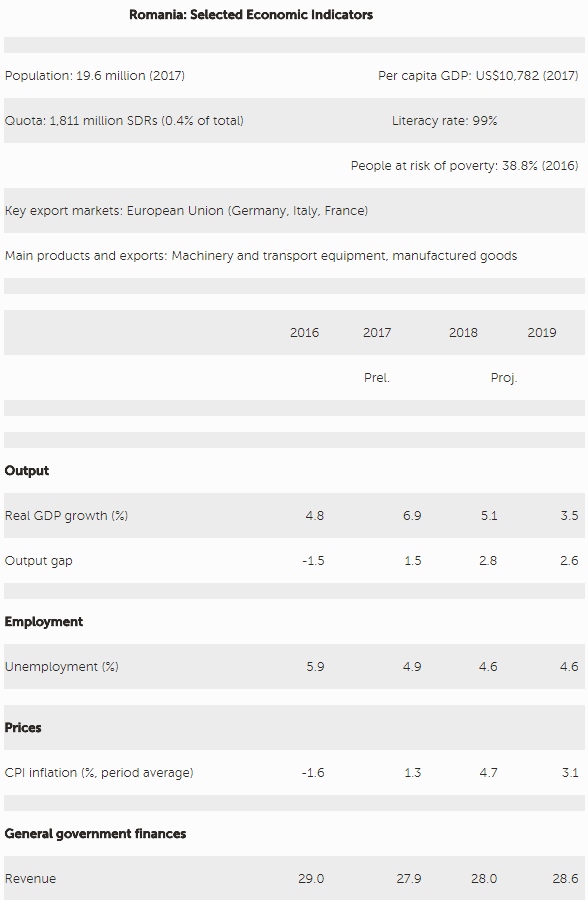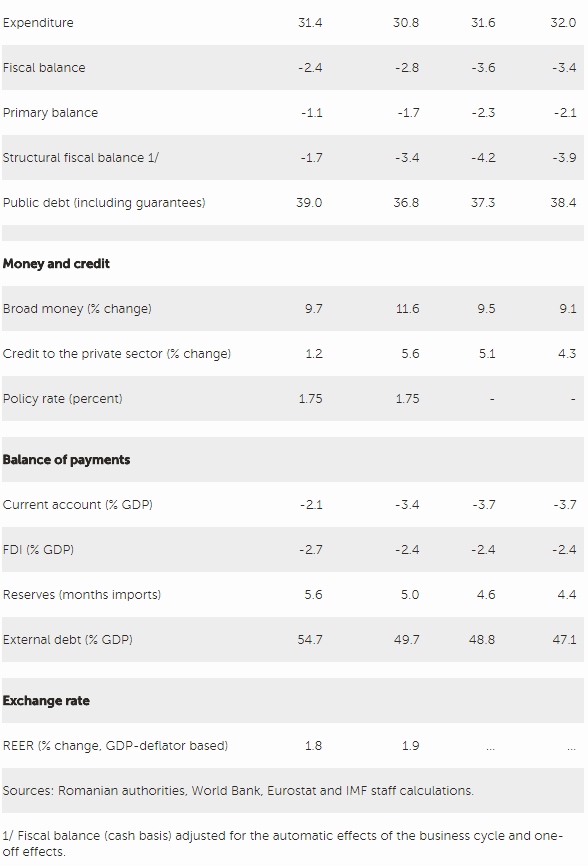Romania: IMF Executive Board Concludes Article IV Consultation
On June 4, 2018 the Executive Board of the International Monetary Fund (IMF) concluded the Article IV consultation with Romania.
Romania recorded strong economic growth in 2017, with record low unemployment and an improving financial sector. Private consumption boosted by fiscal stimulus and wage increases led the strong growth, while investment lagged and structural reforms slowed. Public investment fell to a multi-year low in percent of GDP with a low absorption of EU funds. Both the government deficit and current account deficit widened, respectively to 2.8 and 3.4 percent of GDP in 2017. Reflation is quickly gathering pace. While the National Bank of Romania’s inflation target was met in 2017, headline inflation has risen since January above the upper end of the band, reaching 5.2 percent (y/y) in April 2018.
Growth is expected to reach 5 percent in 2018—led again by continuing stimulus to private consumption from fiscal relaxation—and accompanied by a current account deficit and elevated inflation, even as monetary policy is tightened. Growth is expected to moderate to 3 percent in the medium term as the transitory effects of the fiscal stimulus fade, and lagging investment and lack of sustained progress on structural reforms would constrain potential growth over the medium term.
With signs of overheating, there is a risk that the current policy trajectory increases macroeconomic volatility, undermines the capacity to withstand adverse shocks, and eventually slows down convergence toward the advanced EU countries. The main external risks to the economic outlook include an abrupt shift in global risk appetite against the backdrop of continued monetary policy normalization. Domestically, further deterioration in fiscal and external balances or a weakening of institutions could disrupt investor confidence. External and domestic shocks could coincide and weaken confidence and capital flows. Maintaining Romania’s adequate reserve levels, fiscal buffers and a flexible exchange rate would help against these risks.
Executive Board Assessment
Executive Directors welcomed the robust growth, reduced unemployment and improved financial sector conditions. Directors raised, however, concerns about emerging signs of overheating, including higher inflation and twin deficits, as well as lagging investment and slower structural reforms. Against this background, they called for a tighter macro‑economic policy stance, while strengthening the medium‑term orientation and predictability of policies to sustain Romania’s convergence to higher living standards within the EU.
Directors noted that a more cautious fiscal policy stance would help economic rebalancing and reduce the burden on monetary policy. In the context of strong economic growth, they recommended a fiscal target below the 2018 Budget target of 3 percent of GDP, and noted that additional fiscal measures would likely be needed to reach this target.
Directors encouraged fiscal reforms to ensure achievement of Romania’s medium‑term budgetary objective. They emphasized the need to avoid further tax cuts, moderate wage and pension increases, and review the implementation of the unified wage law and pension changes in line with available fiscal space and medium‑term fiscal objectives. Directors stressed the importance of reforms to enhance the efficiency of the public sector by strengthening tax administration to improve tax collection efficiency, raising expenditure efficiency through expenditure reviews and centralizing procurement, and improve EU Funds absorption.
Directors supported the monetary tightening that had been undertaken to curb inflation. They encouraged the central bank to remain vigilant and pursue further policy tightening as necessary to anchor inflation expectations to the targeted level. The central bank should continue to manage liquidity conditions to enhance monetary transmission.
Directors emphasized the need to accelerate the structural reform momentum. They called for improving public investment management institutions to fully utilize EU funds and address large infrastructure needs. Directors emphasized the need for strong corporate governance in the state‑owned enterprises. They also noted that the minimum wage mechanism should balance social and competitiveness concerns. Recognizing past progress made in the fight against corruption, Directors encouraged the authorities to maintain the reform momentum.
Directors noted the improvements in the financial sector in recent years and the findings of the FSAP. They called for strengthened macroprudential policies to address emerging vulnerabilities from the exposure of banks to the government and the real estate sector. They supported enhancing supervisory practices and the crisis management framework.


Source: International Monetary Fund
- 306 reads
Human Rights
Fostering a More Humane World: The 28th Eurasian Economic Summi

Conscience, Hope, and Action: Keys to Global Peace and Sustainability

Ringing FOWPAL’s Peace Bell for the World:Nobel Peace Prize Laureates’ Visions and Actions

Protecting the World’s Cultural Diversity for a Sustainable Future

Puppet Show I International Friendship Day 2020

